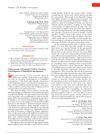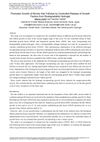5 citations,
April 2022 in “Pharmaceutics” Minoxidil nanoparticles significantly boost hair growth in mice compared to regular minoxidil.
 August 2019 in “Journal of the American Academy of Dermatology”
August 2019 in “Journal of the American Academy of Dermatology” Ginseng and Albizia extracts help prevent hair thinning with age.
 2 citations,
March 2019 in “Plastic and Reconstructive Surgery”
2 citations,
March 2019 in “Plastic and Reconstructive Surgery” The letter suggests that a modified fat processing technique may increase regenerative cells but calls for more trials to confirm its effectiveness for skin and hair treatments.
 November 2023 in “Food science of animal resources”
November 2023 in “Food science of animal resources” Lactilactobacillus curvatus LB-P9 taken orally helps hair regrow faster and thicker in mice.
 10 citations,
July 2011 in “British Journal of Dermatology”
10 citations,
July 2011 in “British Journal of Dermatology” Lower growth factors linked to balding in androgenetic alopecia.
 January 2022 in “Biomedical Reports”
January 2022 in “Biomedical Reports” Inaudible sound at 30 kHz can boost hair growth and decrease hair loss by promoting cell growth and reducing cell death in hair follicles.
 14 citations,
July 2021 in “Biomolecules”
14 citations,
July 2021 in “Biomolecules” Centipeda minima extract helps hair grow by activating important growth signals and could be a promising hair loss treatment.
January 2020 in “Journal of Genetics and Gene Therapy” The combination of hair follicle stem cells and PRP shows promise for treating hair loss in Asian men and women.
 August 2014 in “Journal of clinical & experimental dermatology research”
August 2014 in “Journal of clinical & experimental dermatology research” Platelet-released growth factors can treat hair loss by activating hair follicle stem cells, blocking certain pathways, and controlling inflammation and fibrosis.
 January 2022 in “Stem cell biology and regenerative medicine”
January 2022 in “Stem cell biology and regenerative medicine” The document concludes that hair follicle regeneration involves various factors like stem cells, noncoding dsRNA, lymphatic vessels, growth factors, minoxidil, exosomes, and induced pluripotent stem cells.
 17 citations,
April 2021 in “Molecules/Molecules online/Molecules annual”
17 citations,
April 2021 in “Molecules/Molecules online/Molecules annual” Linoleic acid from Malva verticillata seeds may help treat hair loss by promoting hair cell growth and blocking baldness signals.
 April 2024 in “Bioactive materials”
April 2024 in “Bioactive materials” New microneedle treatment with growth factors and a hair loss drug shows better and faster hair growth results than current treatments.
 355 citations,
August 2013 in “Acta Biomaterialia”
355 citations,
August 2013 in “Acta Biomaterialia” The nanofibers with two growth factors improved wound healing by supporting structure, preventing infection, and aiding tissue growth.
 136 citations,
May 2019 in “Cells”
136 citations,
May 2019 in “Cells” Stem cell therapy, particularly using certain types of cells, shows promise for treating hair loss by stimulating hair growth and development, but more extensive trials are needed to confirm these findings.
 June 2005 in “Key Engineering Materials”
June 2005 in “Key Engineering Materials” Using hydrogels to slowly release growth factors can effectively boost hair growth in mice.
 23 citations,
July 1996 in “Archives of Dermatological Research”
23 citations,
July 1996 in “Archives of Dermatological Research” bFGF, VEGF, and minoxidil decrease collagen production in hair cells, possibly affecting hair growth.
 9 citations,
April 2019 in “International Journal of Molecular Sciences”
9 citations,
April 2019 in “International Journal of Molecular Sciences” Kojyl cinnamate ester derivatives can promote hair growth by increasing adiponectin production in fat tissues.
 February 2024 in “Advanced Science”
February 2024 in “Advanced Science” The new scaffold with two growth factors speeds up skin healing and reduces scarring.
 October 2005 in “CRC Press eBooks”
October 2005 in “CRC Press eBooks” Telogen effluvium is a condition where hair falls out due to various factors like illness, stress, or nutrient deficiency.
6 citations,
August 2022 in “International journal of molecular sciences” α-Phellandrene may help prevent hair loss by increasing growth factors and cell growth in hair cells through a specific signaling pathway.
 June 2020 in “The journal of investigative dermatology/Journal of investigative dermatology”
June 2020 in “The journal of investigative dermatology/Journal of investigative dermatology” Platelet-rich Plasma Gel may help treat en coup de sabre scleroderma, improving symptoms and skin quality with minimal side effects.
144 citations,
December 2017 in “Pigment cell & melanoma research” Melasma is now considered a skin aging disorder caused by sun exposure in people with a genetic tendency, which impacts treatment and prevention approaches.
 16 citations,
April 2017 in “Journal of Cosmetic Dermatology”
16 citations,
April 2017 in “Journal of Cosmetic Dermatology” Ficus carica leaf extract may help treat skin disorders by reducing inflammation and androgen effects in skin cells.
 3 citations,
January 2016 in “Biotechnology and Bioprocess Engineering”
3 citations,
January 2016 in “Biotechnology and Bioprocess Engineering” Laminaria japonica extract with IGF-1 improved mouse hair growth and could be a potential alopecia treatment.

Chrysanthemum zawadskii extract may help treat hair loss by promoting hair growth and affecting growth factors.
52 citations,
September 2017 in “Current Stem Cell Research & Therapy” Adipose-derived stem cells can help treat hair loss.
 January 2013 in “Yearbook of Urology”
January 2013 in “Yearbook of Urology” The Princeton III Consensus recommends assessing cardiovascular risk in men with erectile dysfunction and prioritizing heart health before treating ED, especially in those with potential heart disease.
2 citations,
September 2022 in “Journal of trace elements in medicine and biology” Sodium pentaborate pentahydrate can increase hair growth and improve hair quality at certain doses.

Garlic can help hair grow by activating certain growth pathways, and it works whether you eat it or apply it to your scalp.
 7 citations,
December 2017 in “Anais da Academia Brasileira de Ciências”
7 citations,
December 2017 in “Anais da Academia Brasileira de Ciências” 6-Gingerol from ginger may slow down hair growth by affecting certain enzymes and growth factors.























